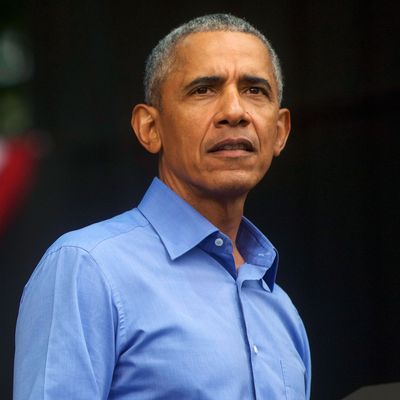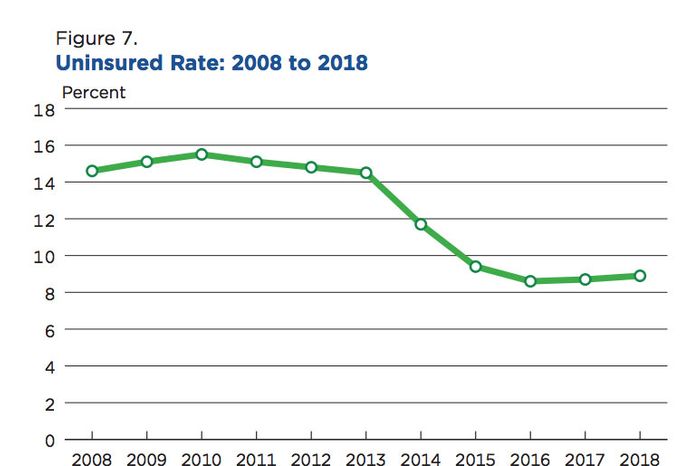
I have read many left-wing attacks on the Obama legacy. I cannot recall one as glib or shallow as Corey Robin’s recent Dissent essay — at least not corrected for length; Robin packs a tweet’s worth of analytic heft into 6,000 words of verbiage. He begins the essay by asking, “What is the defining achievement of Barack Obama?” He answers his own question in a paragraph and then, having resolved the question to his own satisfaction, wanders off into a series of character portraits dismissing various Obama veterans as shallow careerists.
Here is Robin’s first paragraph, the one that contains almost the entirety of his argument:
What is the defining achievement of Barack Obama? For a time, it seemed it would be his foreign policy: the Paris Agreement, diplomatic relations with Cuba, and getting Iran to give up its nuclear weapons program. When Trump got elected and those deals got undone, it seemed it would be the Affordable Care Act. But after plummeting for several years, the uninsured rate among adults has begun to creep back up. Obama did avert a second Great Depression, but history is not kind to averters: with time, what didn’t happen tends to get eclipsed by what did.
Begin with the first sentence, which is also the subhead of the article. Why does it matter if those policy changes produce a “defining achievement”? Robin does not say. If you assume the purpose of politics is to enact policies that improve peoples’ lives, then it wouldn’t matter if that change comes in the form of, say, a half-dozen medium-sized policy reforms or one very large “defining” achievement. So right away we see Robin has set the terms so as to define Obama as a failure. It doesn’t matter how many policy changes he enacted, or how well they worked — all Robin has to do is deny that any single one of them is “defining,” a criteria that is helpfully vague.
In the second sentence, Robin mentions several of Obama’s foreign-policy accomplishments: “For a time, it seemed it would be his foreign policy: the Paris Agreement, diplomatic relations with Cuba, and getting Iran to give up its nuclear weapons program.”
Robin states these deals were “undone,” but that is an exaggeration bordering on outright falsehood. Trump has attacked all three, but so far they largely remain intact: Despite Trump’s promise to withdraw in December 2020, the Paris Agreement — the purpose of which was to create a global framework for greenhouse gas emissions — remains in place. It can be rejoined by the United States if a Democrat wins next year, and can still survive (in diminished form) without the U.S. even if Trump wins reelection. Trump has left the Cuba opening mostly intact, and Iran still hasn’t restarted its nuclear program in the face of Trump’s flailing, ineffectual threats. If he is implying that none of the three foreign policy successes individually counts as “defining,” he is simply demonstrating again the uselessness of his chosen metric.
In the next two sentences, Robin observes that it “seemed” the Affordable Care Act would qualify, but, “the uninsured rate among adults has begun to creep back up,” so we are left to conclude the ACA did little or no good. The construction of this clause is interesting. The uninsured rate is creeping up, as if the rate is acting on its own. The Trump administration has given Republican-run states the ability to impose onerous paperwork requirements on Medicaid recipients, reducing the take-up rate. This has produced a slight reversal of the very large drop in the uninsured rate Obamacare produced:
That slight upward tilt at the right edge of the graph is the creeping upward Robin brandishes to dismisses the whole of the trend.
Of course the fight over health-care coverage, and many of the other avenues of progress Obama wrought, have continued. Most fights in American politics do. Obama’s critics on left and right alike have seized upon Trump as repudiation of Obama’s legacy, and Robin joins them in finding it useful to exaggerate Trump’s substantive policy success. Yet the whole gambit of dismissing a president’s achievements by highlighting the reaction that followed is a standard to have been invented for Obama. Conservatives have rolled back some of the mid-20th century expansions in voting rights, and most of the increase in unionization, but these facts are not usually invoked for the purpose of taunting the drafters of the 1935 Labor Relations Act or the 1965 Voting Rights Act.
Robin does return to the Obamacare story later in his essay, to harshly critique the ideological style of Obama’s insurance regulations and subsidies. He dismisses the system in two sentences, neither of which is correct: “The exchange was built on Obama’s commitment to access, markets, and voluntarism,” he writes, “Instead of being automatically enrolled in a government program, the uninsured would enroll themselves in mostly private plans.” In fact, Obama was not “committed” to voluntarism and markets, nor opposed to a “government program,” which is why he tried to include a public option (government program!) and did include an individual mandate (the opposite of voluntarism). The “neoliberal” epithet makes its inevitable appearance.
Robin does not mention or even hint at the actual purpose of the exchange. Working from his premise that a single-payer system would be ideal, but that it was politically impractical to move 150 million people off employer-based insurance onto a public plan, Obama designed a system to create affordable insurance for people locked out of the employer-based system. The combination of regulations preventing insurers from medically screening customers and subsidies to make coverage affordable for those with low-income has worked. (Surprisingly, the individual mandate, which most analysts deemed crucial, has turned out to be unnecessary to make the system work.)
Insurance premiums on the market have come in at the forecasted level, and the exchanges have proven resistant even to the fanatical sabotage campaign mounted against them. Rates on the exchanges have actually now dropped for two years in a row.
Like any social reform, Obamacare has limitations and shortcomings. Robin does not bother to delve into any of them. His piece instead lingers for eight paragraphs on the White House’s use of a “Between Two Ferns” episode to drive public awareness of the exchanges. The episode so appalls Robin, with its combination of celebrity activism and reliance on market dynamics, that he has no time to even consider that the exchanges made medical care available to millions of people who were previously too poor or medically risky to afford it.
Finally, we come to the last sentence in Robin’s indictment: “Obama did avert a second Great Depression, but history is not kind to averters: with time, what didn’t happen tends to get eclipsed by what did.”
The first clause there is Robin’s way of sweeping up a broad swath of economic rescue policies: The American Recovery and Reinvestment Act, which is the largest fiscal stimulus and also the largest green energy investment in American history; the bank restructuring, and the auto bailout, which in combination averted a depression, as well as Dodd-Frank, which restructured the financial industry, along with establishing the Consumer Financial Protection Bureau.
Averting a second Great Depression seems like a pretty big deal. The first Great Depression was, after all, pretty terrible. Yet, after backhandedly crediting this, Robin dismisses it in the second half of the sentence, again using the passive voice (“what didn’t happen tends to get eclipsed by what did”) to present this alleged failure as the inevitable product of impersonal forces that can stay outside Robin’s analytic crosshairs. It might be nice, in a perfect world, to credit Obama’s energetic combination of rapid legislative and executive action with preventing a catastrophe, but these things tend to get eclipsed. That’s just what happens, folks. Robin doesn’t make the rules.
Obama’s record is obviously not beyond legitimate critique. The 44th president had failures and shortcomings like every other one. (Robin, like many radicals, gestures at the model of an idealized Franklin Roosevelt as a contrast, ignoring Roosevelt’s many ideological and substantive reversals.) For the most part, though, he simply declares Obama a failure and devotes himself to expressions of disgust at his political style and the people who worked for him.
His lack of interest in engaging with the actual choices and trade-offs that occupied Obama’s presidency is a sign that, within his ideological bubble on the left, the argument about Obama is settled. It doesn’t need to be made, just referred to. But if and when Democrats return to power, Robin is going to find that the argument he thinks has been settled, and the liberals he believes he has vanquished, remain very much alive.































